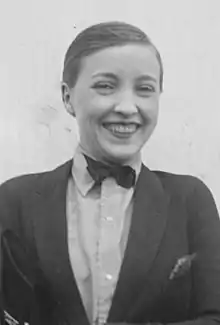Eton crop
The Eton crop is a type of very short, slicked-down crop hairstyle for women.[1] It became popular during the 1920s because it was ideal to showcase the shape of cloche hats.[1] It was worn by Josephine Baker, among others.[1] The name derives from its similarity to a hairstyle allegedly popular with schoolboys at Eton.[2]

The Eton crop appears to have emerged in Britain in the mid-1920s: the first use of the phrase in The Times is in September 1926. It was a severe hairstyle, emphasising the shape of the head and focusing interest on the face. By June 1927 Margot Asquith, Lady Oxford, was deriding it: "Women with neither backs nor tops to their heads, and faces as large as hams, appear at the King's Drawing Rooms with the nuque of their necks blue from shaving..".[3] By 1930 it seems to have become outmoded among the most fashionable. A critic reviewing a collection of society portraits notes: "Hairdressing is in a state of transition. There is an Eton crop, there are many soft shingles, and there are a few heads where the hair is being let grow."[4]
It was the choice haircut for the more masculine lesbians in the lesbian subculture, particularly in England, during its time of popularity.[5]
References
- Vargas, Whitney. "Head Start." Elle (Sept. 2007): p190.
- Oxford English Dictionary, 1989 edition.
- ASQUITH, M. Lay sermons, 1927.
- The Times, Wednesday, May 14, 1930; pg. 19; Issue 45512; col F
- Gay Life and Culture, 2006